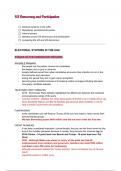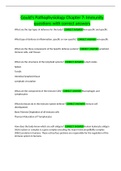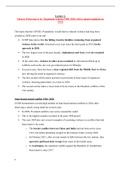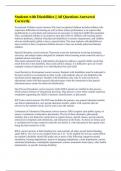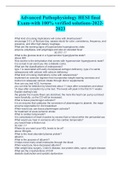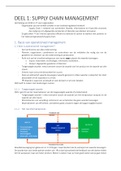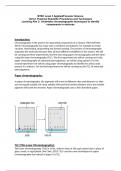electoral systems in the USA
Republican and Democrat parties
Interest groups
debates around US democracy and participation
comparing the UK and US democracy
ELECTORAL SYSTEMS IN THE USA
STAGES OF THE NOMINATION PROCESS
INVISIBLE PRIMARY
- the people not the parties choose the candidates
- this begins over a year in advance
- loosely defined period from when candidates announce their intention to run to the
first primaries and caucuses
- during this period they aim to gain name recognition
- becoming less invisible because of increasing media coverage including televised
intra-party candidate debates
TELEVISED PARTY DEBATES
- 2019 - Democratic Party debates highlighted the differences between the moderate
and progressive wings of the party
- common problem - debates are rarely about policy and tend to be a 'media circus' eg.
when Elizabeth Warren and Bernie Sanders got personal about whether or not he
said a woman could never win presidency
FUNDRAISING
- some candidates can self-finance (Trump 2016) but most need to raise money from
donors/interest groups
- Michael Bloomberg spent $409 million and did not even make the final two
FRONT RUNNERS
- it has been considered important, conventionally, that you are the front-runner by the
end of the invisible primaries because it usually, they become the nominee (eg. in
2016 Clinton - 14 point lead over Bernie and Trump - 16 point lead over Ted
Cruz)
- 2020 - Although Biden was ahead in nearly all the polls and had 46
endorsements from senators and governors, Sanders had raised $60 million
and Biden came fifth place for fundraising
- although sometimes dubbed the 'money primary', this is not always true of the end
result
- popularity seems to matter more
,PRIMARIES AND CAUCUSES
functions:
- to show the popularity of a presidential candidate
- to choose delegates to attend the National Party conventions
CAUCUSES
- closed meeting of party members in each state in which delegates select the party's
choice for presidential candidate
- usually in geographically large but thinly populated states like Iowa and Nevada
- low turnout because not many people have the time to go to hours of a meeting
- most likely old and retired people will go - only one demographic
- disproportionately more ideological because only the politically engaged will go
PRIMARIES
- some choose to hold theirs early like New Hampshire and Iowa so no one else has
theirs on the same day
- others deliberately arrange theirs on the same day as other nearby states - eg. 14
states on Super Tuesday - way of getting attention, esp for smaller states because
coverage might cause turnout
- earlier primaries are seen to have more influence over candidate selection
- front loading - more states moving their primaries earlier
types
- OPEN: a registered voter may vote in any party primary regardless of their party
affiliation eg. in the 2012 Wisconsin Republican open primary, 11% of voters
were Democrats and although Mitt Romney won over Rick Santorum, amongst
the Democrats Santorum beat Romney by an average of 20 points, suggesting
they were tactically voting for an easier option because he was more conservative
than Romney
- could show a candidate has cross party support though
- MODIFIED/SEMI-CLOSED: independents can vote in a party's primary
- CLOSED: voters can only vote in a party's primary if they are registered as a member
of that party
- (some states don't even bother with a primary if there is an incumbent running)
delegates
- super-delegates (democrats) pledged delegates (republicans) are undemocratic - act
as a security blanket to sway the vote if necessary
- controversial because it used to be down to super-delegates to make the decision
criticisms of the process
- voter apathy
- voters are unrepresentative of the voting population esp. in caucuses
- process is too long and expensive
- dominance of the media
- primaries can develop into personal rivalries
, - lack of 'peer review' when selecting presidential candidates - the public doesn't
always make the right decision so a candidate may not have what it takes to win →
this is why there were superdelegates, to 'correct' those decisions
- But it maintains federalism
CHOOSING A RUNNING MATE
- before it used to be the second-place finisher in the elections but this changed after
the 12th amendment in 1804
STRATEGIES: A BALANCED TICKET
- a running mate may be chosen to increase voter appeal for the 'ticket' by choosing a
candidate that appeals to different voters
- JFK was from Boston and chose Johnson, a southern democrat (1960) -
REGION
- John McCain chose Sarah Palin - GENDER, AGE
- Obama chose Biden (2008,2012) - RACE
STRATEGIES: POTENTIAL IN GOVT
- George W Bush (2000) chose Dick Cheney, former secretary of defence
- Eisenhower (1950) chose Nixon, former senator
- Mitt Romney (2012) chose Paul Ryan, Congressman since 1999, Chairman of House
Budget Committee, and lost to Obama
STRATEGIES: PARTY UNITY
- choose a former rival from the primaries
- Reagan and Bush 1984
NATIONAL PARTY CONVENTIONS
held by Democrats, Republicans and some minor parties in July/August of an election year
purposes
- to select the party's presidential candidate
- to choose the vp candidate
- to decide the party platform
SELECTING THE PARTY'S CANDIDATE
- conventions are attended by delegates, mainly chosen in the primaries and caucuses
- they choose the candidate in a roll-call vote
- since most are 'committed delegates', the outcome is usually known beforehand and
the convention merely confirms the frontrunner as the candidate
- if no candidate wins the first ballot, further rounds happen until one does and the
delegates become free agents (not happened since 1956)
- traditionally the VP candidate is also announced (but it is known beforehand)

